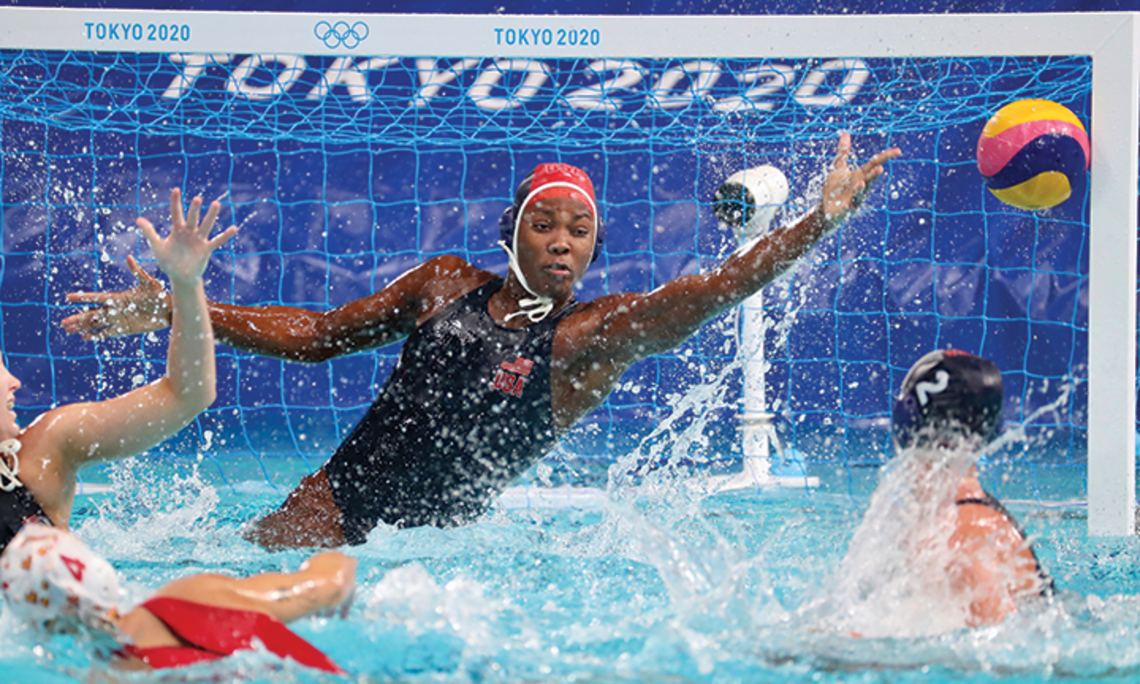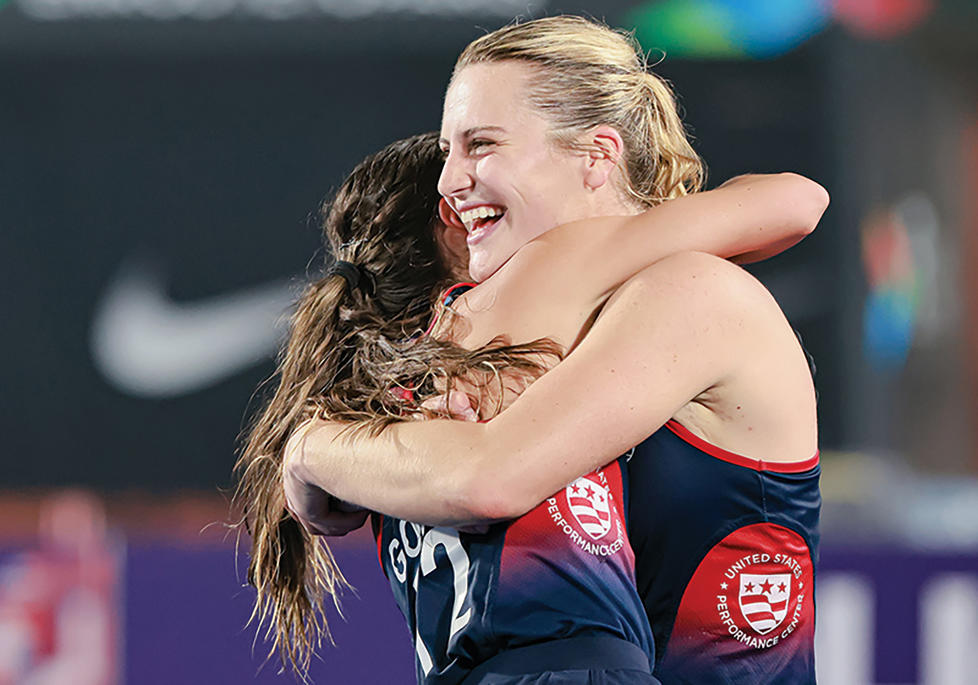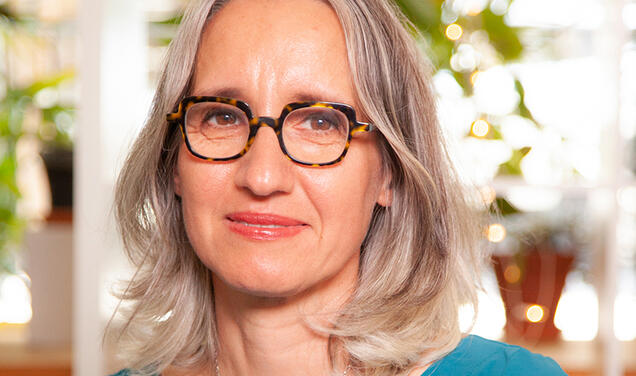
ROWING
These events feature the largest and most internationally diverse cohort of Tigers at the Paris Olympics. Alumni rowers and scullers have won medals in each of the past five Olympics. Rowing will be contested daily from July 27 through Aug. 3, with final heats July 31 through Aug. 3.
Claire Collins ’19, United States (women’s eight)
Collins, who rowed in the women’s four at the Tokyo Olympics, will try to help the U.S. return to the podium in the women’s eight after its gold-medal run ended with a fourth-place finish in 2021.
Tom George ’18, Great Britain (men’s pair)
An Olympic bronze medalist in the men’s eight in Tokyo, George has been paired with Yale alum Ollie Wynne-Griffith since 2022, winning gold medals in six different World Cup events.
Jonas Juel ’22, Norway (men’s quadruple sculls)
Juel, a first-time Olympian, helped Norway secure one of the last spots in Paris with a wire-to-wire victory at the World Rowing Olympic Qualification Regatta in May.
Emily Kallfelz ’19, United States (women’s four)
Kallfelz earned her first Olympic spot and will row with fellow alumna Kelsey Reelick ’14 in a boat that placed third at a recent World Cup event in Switzerland.
Tim Masters ’15, Australia (men’s four)
A member of Australia’s men’s eight at the Tokyo Olympics, Masters will make his return to the Games in the men’s four with a boat that won silver at the June World Cup event in Poland.
Nick Mead ’17, United States (men’s four)
Mead, the USRowing Male Athlete of the Year in 2021, is another former men’s eight rower who has transitioned to the men’s four. His boat won silver at last year’s World Championships.
Kathleen Noble ’18, Uganda (women’s single sculls)
Uganda’s first Olympic rower, Noble placed 26th in the highly competitive single sculls in Tokyo. She told CNN that she hopes her participation will help elevate the sport in her country.
Kelsey Reelick ’14, United States (women’s four)
A first-time Olympian with an impressive international résumé, Reelick rowed on Princeton’s varsity eight for four years, including two with her sister Erin ’16.
Hannah Scott ’21, Great Britain (women’s quadruple sculls)
Scott returned home during the COVID pandemic and worked her way onto Great Britain’s Olympic team for 2021. Her boat won gold at the 2023 World Championships.
FENCING
Four students and three alumni will compete in what three-time Olympian Kat Holmes ’17 calls the “objectively cool” sport of fencing. “People are hitting each other with swords,” she says. “I think that it kind of speaks for itself.” Fans agree: Tickets for the competition, which runs from July 27 through Aug. 4, sold out in less than two weeks.
Maia Chamberlain ’22, United States (women’s team saber)
Chamberlain won the NCAA individual saber championship in 2018 as a sophomore. Originally from California, she trained for the Olympics in New York City.
Sabrina Fang ’27, Canada (women’s team foil)
Fang, who is from Kitchener, Ontario, will make her Olympic debut less than a year after helping Canada claim silver in women’s team foil at the Pan American Games.
Mohamed Hamza ’23, Egypt (men’s individual and team foil)
At age 23, Hamza is competing in the Olympics for the third time. His senior year included a runner-up individual finish at the NCAA Championships and, shortly after graduation, individual and team gold medals at the African Championships.
Kat Holmes ’17, United States (women’s team epee)
Representing the U.S. at the Olympics for the third time, Holmes is among the team’s most experienced athletes and was a member of the 2018 women’s epee team that won America’s first World Championship in the event.
Hadley Husisian ’26, United States (women’s individual and team epee)
A star in the junior ranks with two individual world titles (2022 and 2023), Husisian won bronze in the NCAA Championships as a Princeton freshman before taking a gap year to train for Paris.
Tatiana Nazlymov ’27, United States (women’s individual and team saber)
Nazlymov earned enough points to qualify for the Olympic team while also competing in her freshman year at Princeton. She helped the U.S. win gold in women’s team saber at the 2023 Pan American Games.
Maia Weintraub ’25, United States (women’s team foil)
Weintraub won the NCAA individual foil championship in 2022, her freshman year at Princeton, and placed third the next year. She took a gap year to train for Paris, earning a place in the team foil event.
WATER POLO
The United States is a women’s water polo juggernaut, thanks in part to two-time gold medalist and four-time world champion Ashleigh Johnson ’17. The U.S. group stage games are on July 27, 29, and 31, and Aug. 2. Knockout-stage games will be played Aug. 6 (quarterfinals), Aug. 8 (semifinals), and Aug. 10 (gold and bronze medal games).
Ashleigh Johnson ’17, United States (goalkeeper)
In 2016, Johnson became the first Black woman to play for the U.S. Olympic water polo team. Eight years later, she has a chance to make history again as the first goalkeeper to win three gold medals.
Jovana Sekulic ’26, United States (center)
Sekulic’s family moved from Serbia to Pennsylvania when Jovana was 11, and water polo, she told PAW, played an important role in her transition to life in the U.S. She took a gap year from college to compete for an Olympic roster spot.
TRACK AND FIELD
Princetonians have competed in track and field events since the first modern Olympics in 1896, when Robert Garrett, Class of 1897, led the U.S. team with wins in both the shot put and discus events. This year, Obiageri Amaechi ’21 opens the Games in the discus Aug. 2 (qualification) and Aug. 5 (final); Simen and Sondre Guttormsen ’23 will compete in the pole vault on Aug. 3 (qualification) and Aug. 5 (final); and Lizzie Bird ’17 will run the steeplechase Aug. 4 (qualification) and Aug. 6 (final).
Obiageri Amaechi ’21, Nigeria (women’s discus)
Amaechi won silver at the African Championships in Douala, Cameroon, in June — part of a three-athlete medal sweep by Nigeria — and earned her first trip to the Olympics.
Lizzie Bird ’17, Great Britain (women’s 3,000-meter steeplechase)
Bird, a 2021 Olympian, placed third in European Championships in June and then won her event at the UK trials, finishing in a meet-record time of 9:29.67.
Simen Guttormsen ’23, Norway (men’s pole vault)
Guttormsen qualified for the NCAA Championships as a Princeton senior. As a grad student at Duke this year, he placed third in the NCAA outdoor meet, weeks after winning the ACC pole-vault title.
Sondre Guttormsen ’23, Norway (men’s pole vault)
Guttormsen, Simen’s older brother and a three-time NCAA champion, will be making his second appearance at the Olympics. He won gold at the 2023 European Indoor Championships.
3X3 BASKETBALL
The U.S. men, making their 3x3 Olympic debut, are scheduled to play July 30 and 31 and Aug. 1, 2, and 4. Semifinals and the gold and bronze medal games are on Aug. 5.
Kareem Maddox ’11, United States
Maddox, at age 34, is Princeton’s oldest Olympian this year and a veteran leader for the United States 3x3 men’s team, which won the Pan American Games in October 2023.
FIELD HOCKEY
Beth Yeager ’26 took a gap year to help the United States qualify for Paris. The U.S. group stage games are on July 27, 29, and 31, and Aug. 1 and 3. Knockout-stage games will be played Aug. 5 (quarterfinals), Aug. 7 (semifinals), and Aug. 9 (gold and bronze medal games).
Beth Yeager ’26, United States (midfielder)
An All-American in each of her two seasons at Princeton, Yeager played more than 50 games for the U.S. national team before her 21st birthday.
SWIMMING
Among the most popular sports in the Olympic program, swimming has a wide-ranging schedule that runs from July 27 through Aug. 4. Adell Sabovic ’25 is Princeton’s lone competitor.
Adell Sabovic ’25, Kosovo (men’s 100-meter freestyle)
Sabovic, who lives in New York and is a native of Peja, Kosovo, qualified to represent his homeland in the 100-meter freestyle.










1 Response
Heather Prince *22
1 Year AgoCelebrating Olympians With a Questionable Comparison
It is exciting to hear that there will be so many current and former Princeton students competing in Paris! However, comparing Princeton’s Olympian production rate to those of Angola, Botswana, Vietnam, and Moldova (New at PAW Online, July 9, 2024) as a way of showing how impressive Princeton is seems very reductive. Was that sentence meant to imply that Princeton is more athletic than those countries? Or was it attempting to highlight that the inequality between countries is so extreme, the sporting infrastructure so disparate, and Princeton and its students so privileged, that even among the entire population of Botswana, for example, so few of its athletes are able to attend the Olympics? If you are going to throw out a comparison like that I would like to see some investigation into the reason for the disparity between the number of Olympic athletes from entire countries compared to from one small institution. If you are not prepared to look into this then perhaps the comparison was unnecessary.